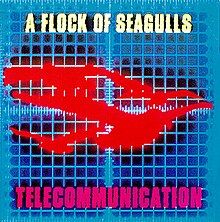Synth-pop is a music genre that first became prominent in the late 1970s and features the synthesizer as the dominant musical instrument. It was prefigured in the 1960s and early 1970s by the use of synthesizers in progressive rock, electronic, art rock, disco, and particularly the Krautrock of bands like Kraftwerk. It arose as a distinct genre in Japan and the United Kingdom in the post-punk era as part of the new wave movement of the late 1970s.

A Flock of Seagulls are an English new wave band formed in Liverpool in 1979. The group, whose best-known line-up comprised Mike Score, Ali Score, Frank Maudsley and Paul Reynolds, hit the peak of their chart success in the early 1980s.

William Nelson is an English singer, guitarist, songwriter, producer, painter, video artist, writer and experimental musician. He rose to prominence as the chief songwriter, vocalist and guitarist of the rock group Be-Bop Deluxe, which he formed in 1972. Nelson has been described as "one of the most underrated guitarists of the seventies art rock movement". In 2015, he was recognised with the Visionary award at the Progressive Music Awards.
Popular music of the United Kingdom in the 1980s built on the post-punk and new wave movements, incorporating different sources of inspiration from subgenres and what is now classed as world music in the shape of Jamaican and Indian music. It also explored the consequences of new technology and social change in the electronic music of synthpop. In the early years of the decade, while subgenres like heavy metal music continued to develop separately, there was a considerable crossover between rock and more commercial popular music, with a large number of more "serious" bands, like The Police and UB40, enjoying considerable single chart success.

Wang Chung are an English new wave band, formed in London in 1980 by Nick Feldman, Jack Hues and Darren Costin. The name Wang Chung is Chinese, meaning "yellow bell" in English, and is the first note in the Chinese classical music scale. The band found their greatest success in the US, with five top 40 hits there, all charting between 1983 and 1987, including "Dance Hall Days", "Everybody Have Fun Tonight" and "Let's Go!".
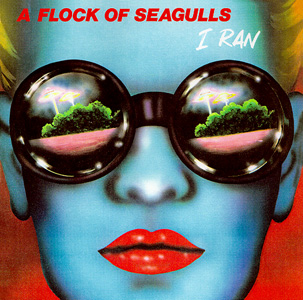
"I Ran (So Far Away)", also released as "I Ran", is a song by English new wave band A Flock of Seagulls. It was released in 1982 as their third single and it was the second single from their self-titled debut album. It topped the chart in Australia, and reached number seven in New Zealand and number nine in the United States. It was not successful in Europe and only reached number 31 in Germany. In the band's home country of the United Kingdom it reached number 43. However, the song was certified silver by the BPI.

A Flock of Seagulls is the debut studio album by English new wave band A Flock of Seagulls, released in April 1982 by Jive Records. It hit No. 10 on the US Billboard 200 and No. 32 on the UK Albums Chart. The album includes the single "I Ran ", which reached the top 10 in the United States and New Zealand, as well as No. 1 in Australia. "Space Age Love Song" also reached the US top 40.

"Radio Free Europe" is the debut single by American alternative rock band R.E.M., released in 1981 on the short-lived independent record label Hib-Tone. The song features "what were to become the trademark unintelligible lyrics which [sic] have distinguished R.E.M.'s work ever since." The single received critical acclaim, and its success earned the band a record deal with I.R.S. Records. R.E.M. re-recorded the song for their 1983 debut album Murmur. The re-recording for I.R.S. became the group's first charting single, peaking at number 78 on the Billboard Hot 100 chart. The song is ranked number 389 in Rolling Stone's 500 Greatest Songs of All Time. In 2009, it was added to the Library of Congress's National Recording Registry for setting "the pattern for later indie rock releases by breaking through on college radio in the face of mainstream radio's general indifference."
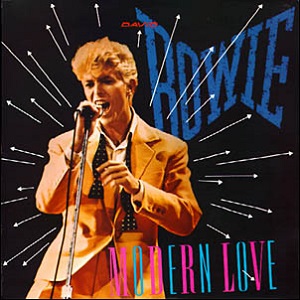
"Modern Love" is a song written by the English singer-songwriter David Bowie. It was released as the opening track on his 1983 album Let's Dance and issued as the third single from the album later in the year. Co-produced by Bowie and Nile Rodgers of the American band Chic, it is a rock song that contains elements of new wave music. It was recorded at the Power Station in Manhattan and was one of the first tracks recorded for the album. It was performed by Bowie on the Serious Moonlight Tour, where it often closed the shows. A music video for the song, directed by Jim Yukich and featuring a performance of the song during the tour, was released in 1983 and played frequently on MTV.

Michael Gordon Score is an English singer, songwriter and musician who achieved fame as the founder, lead vocalist, and keyboardist of the new wave band A Flock of Seagulls. He released a solo album on 1 March 2014 titled Zeebratta.
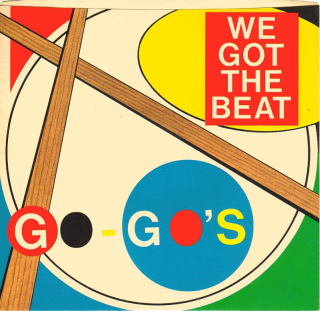
"We Got the Beat" is a song by the American rock band the Go-Go's, written by the group's lead guitarist and keyboardist Charlotte Caffey. The band first recorded the song in 1980 for a single on UK-based Stiff Records, and later rerecorded it for their debut album Beauty and the Beat on I.R.S. Records. The initial single release brought the Go-Go's underground credibility during their first UK tour and in the band's hometown of Los Angeles. The first version reached No. 35 on the U.S. Hot Dance Club Play chart due to its popularity in clubs as an import, and the second version was a top 10 hit in both the United States and Canada. It is considered a new wave classic hit, as well as being the Go-Go's' signature song. The song was named one of "The Rock and Roll Hall of Fame's 500 Songs that Shaped Rock and Roll".
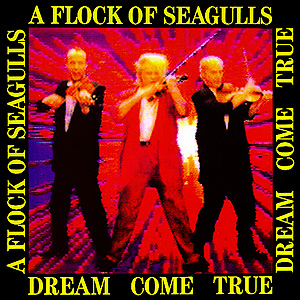
Dream Come True is the fourth album by A Flock of Seagulls, released in March 1986 by Jive Records.

The Light at the End of the World is the fifth studio album by A Flock of Seagulls, released by Big Shot Records in 1995. It was the band's first album since 1986's Dream Come True and was released in the US only.
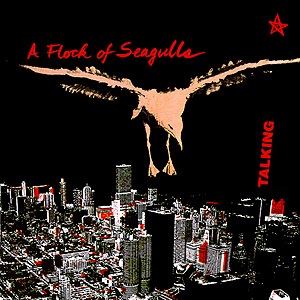
"(It's Not Me) Talking" is the debut single by British new wave band A Flock of Seagulls, originally recorded in 1981. It was re-recorded in 1983 and is featured on their second album Listen. The song is about a man who hears voices in his head, who believes that he is being contacted by aliens from outer space, and who cannot run away from his emotions; wherever he goes, the voice is there.

"Space Age Love Song" is a 1982 single released by the British band A Flock of Seagulls. It was their fourth single. Lead guitarist Paul Reynolds remarked on their 1984 video album Through the Looking Glass that, as the band could not come up with a title for the track, he suggested "Space Age Love Song" because he thought it sounded like a space age love song. The song reached the top 30 in the UK and the US in June 1982 and February 1983 respectively.
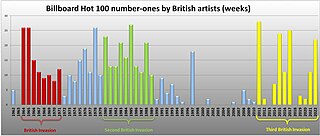
The Second British Invasion was a sharp increase in the popularity of British synth-pop and new pop artists in the United States. It began in the summer of 1982, peaked in 1983, and continued throughout much of the 1980s. MTV began in 1981. Its popularity was the main catalyst for the second British Invasion. According to Rolling Stone, British acts brought a "revolution in sound and style" to the US.
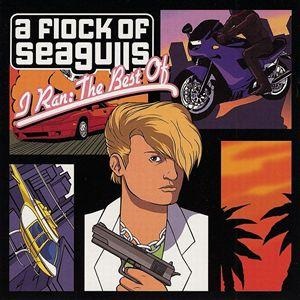
I Ran: The Best of A Flock of Seagulls is an album by new wave band A Flock of Seagulls released in 2004. The album has subsequently been reissued under the titles Space Age Love Songs and Greatest Hits.

Modern Love Is Automatic is a 1981 EP by the British new wave band A Flock of Seagulls, written by Mike Score, Ali Score, Frank Maudsley and Paul Reynolds. The song of the same name was also showcased on their self-titled album the following year. The song peaked at #19 on the US Dance Club Play chart as a double A-side with Telecommunication.

The following is a complete list of recordings by the English new wave band A Flock of Seagulls.
